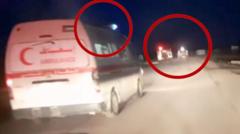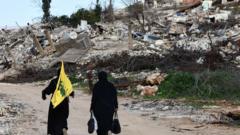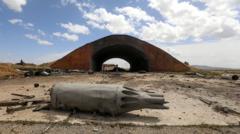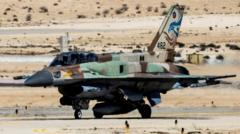Amid escalating tensions in the Middle East, U.S. Deputy Envoy Morgan Ortagus visited Lebanon to address Hezbollah's influence and the challenges of maintaining a fragile cease-fire with Israel.
Lebanon’s Ongoing Struggle: Cease-Fire Fragility and International Diplomacy

Lebanon’s Ongoing Struggle: Cease-Fire Fragility and International Diplomacy
As tensions simmer in the Middle East, U.S. envoy Morgan Ortagus advocates for Lebanon to assert control over Hezbollah amidst a precarious cease-fire.
In a crucial diplomatic mission on Saturday, Morgan Ortagus, the U.S. deputy envoy for the Middle East, met with high-ranking Lebanese officials, including Prime Minister Nawaf Salam, aiming to bolster compliance with a tenuous cease-fire agreement brokered by the United States. This visit comes in the wake of recent hostilities threatening the cease-fire that has been in effect since November.
Lebanon is still grappling with the aftermath of a devastating conflict with Israel, which left around 4,000 dead and caused significant displacement. The Lebanese government is under pressure to control Hezbollah, the Iran-affiliated militant group that historically dominated southern Lebanon but was weakened by the recent war. Under the current cease-fire arrangement, the Lebanese military is slated to take over the region where Hezbollah had previously maintained a stronghold.
In a disturbing turn of events, rockets were recently fired at Israel, resulting in retaliatory airstrikes that targeted zones in Beirut and southern Lebanon. Israel justified these actions by claiming they were aimed at a Hezbollah official, although the group denies involvement in the rocket fire. Despite these provocations, both Israel and Hezbollah appear reluctant to revert to all-out conflict, and the cease-fire has remained intact for the moment.
During her talks with President Joseph Aoun, Ortagus also addressed Lebanon's pressing economic challenges, noting ongoing financial reforms essential for attracting foreign aid, particularly from the U.S. The World Bank estimates the war caused approximately $14 billion in damages, highlighting the need for $11 billion to facilitate reconstruction. Experts suggest that the viability of international assistance hinges on Lebanon's ability to reassert its authority and address the disarmament of Hezbollah, which has historically operated as a quasi-state entity.
Lebanon is still grappling with the aftermath of a devastating conflict with Israel, which left around 4,000 dead and caused significant displacement. The Lebanese government is under pressure to control Hezbollah, the Iran-affiliated militant group that historically dominated southern Lebanon but was weakened by the recent war. Under the current cease-fire arrangement, the Lebanese military is slated to take over the region where Hezbollah had previously maintained a stronghold.
In a disturbing turn of events, rockets were recently fired at Israel, resulting in retaliatory airstrikes that targeted zones in Beirut and southern Lebanon. Israel justified these actions by claiming they were aimed at a Hezbollah official, although the group denies involvement in the rocket fire. Despite these provocations, both Israel and Hezbollah appear reluctant to revert to all-out conflict, and the cease-fire has remained intact for the moment.
During her talks with President Joseph Aoun, Ortagus also addressed Lebanon's pressing economic challenges, noting ongoing financial reforms essential for attracting foreign aid, particularly from the U.S. The World Bank estimates the war caused approximately $14 billion in damages, highlighting the need for $11 billion to facilitate reconstruction. Experts suggest that the viability of international assistance hinges on Lebanon's ability to reassert its authority and address the disarmament of Hezbollah, which has historically operated as a quasi-state entity.




















